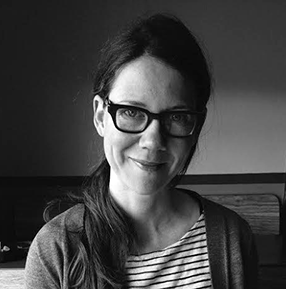A Score for Tourist Movies
If music plays with film
then film is an illustration
of music’s movement.
Snap, blast, sever, sever, stop.
Even the dog twitching his ears.
If islands nestle in the ocean,
and a statue rises above the pilgrim,
then we are standing on a cliff
and the pilgrim has reached her goal.
The light is as pale as the back of her hand.
If the dancers twitch arrythmically
their dance is only partly kept.
At twenty-four frames per second,
film makes a lonely memory.
They sway staccato, staggered, stretched.
If drums repeat the pace
of film’s slip through the gate,
then the song’s refrain
retells film’s fades and cutaways.
Even its night-quiet darks.
If horns evoke an antique joy,
lens flares and close-ups send
their renderings into red relief.
How has mankind managed grief?
Light, noise, movement, breath.
If blood is to the body
as film is to the camera,
if film is a flat and lucid eye,
if light is a perishable gift,
then the night is the gate of the dark.
If light falls away with always
then film is a parcel of rest.
Panoramas, linked and strung
as castle-steps, lawns, the fine
iron bars of the castle gate.
If drums pace the beat of blood
and film is the speed of the rattle
of breath, then the dancers have
truly escaped us. We slow
as they quicken. We go and go.
Copyright © 2013 by Mary Austin Speaker. Used with permission of the author. This poem appeared in Poem-a-Day on March 29, 2013. Browse the Poem-a-Day archive.
“‘A Score for Tourist Movies’ was written after watching this compilation of tourist films that someone strung together and paired with the Beirut album Rip Tide. The two are obviously unrelated, but I was struck by the way film’s flickery rhythm has this way of expressing nostalgia not only for a bygone medium, but for a slower, more deliberate way of seeing. To pair these with music that also has a nostalgic gloss—as much of Beirut’s music does, with its marching-band horn section and steady drums—is to create something very poetic that seems to rescue a piece of the past, of an elegant, bygone empire, perhaps, that seems like it has otherwise slipped away. There is something painful in this recognition, that we ourselves will slip away like the tourists who made these films—our shaky hands, our points of view, the idiosyncratic memories we take away from vacation. So I wrote this poem, which may, as tourist movies do, outlive me, too. I should also mention there’s a nod to “The Waking” by Theodore Roethke in the seventh stanza. Roethke died in 1963, around the time I suspect these films were made. I have never been able to stop hearing his music.”
—Mary Austin Speaker

